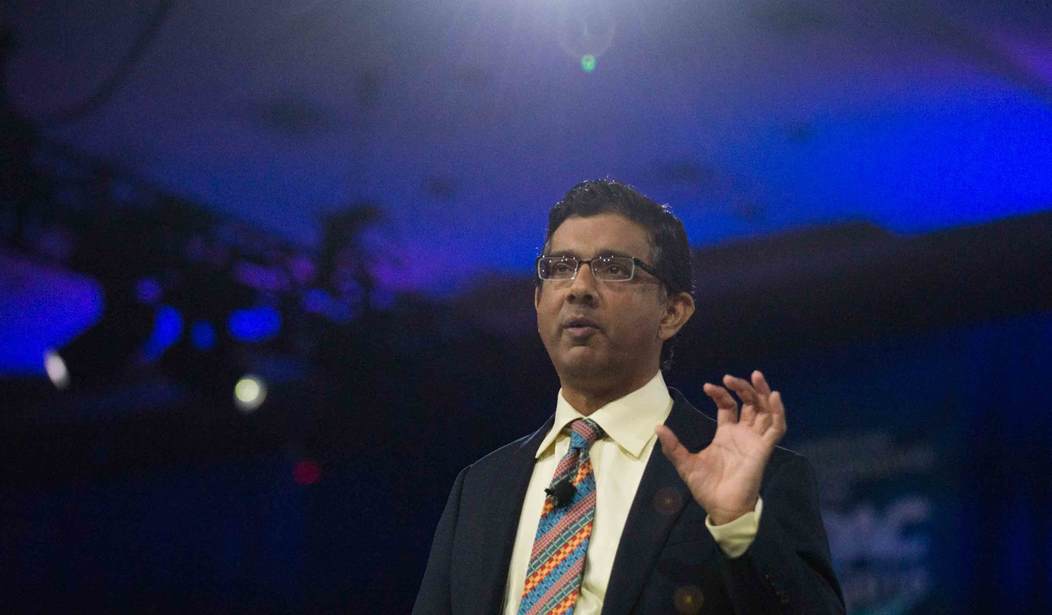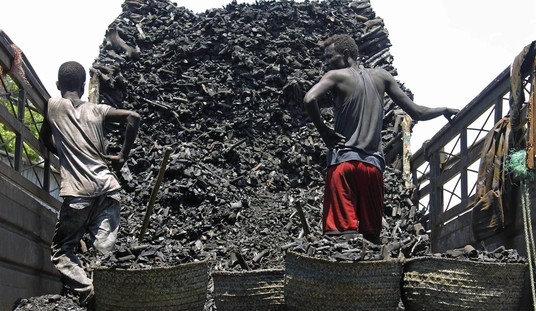President Donald Trump sent a powerful message Thursday by offering a pardon to conservative author and filmmaker Dinesh D’Souza, who claimed that he was selectively targeted for his public attacks on President Barack Obama.
“Will be giving a Full Pardon to Dinesh D’Souza today. He was treated very unfairly by our government!” the president declared on Twitter.
Will be giving a Full Pardon to Dinesh D’Souza today. He was treated very unfairly by our government!
— Donald J. Trump (@realDonaldTrump) May 31, 2018
D’Souza pleaded guilty to a federal charge of making illegal campaign contributions in 2014. He urged friends to donate to the 2012 U.S. Senate campaign of personal friend Wendy Long, and then reimbursed them, circumventing campaign finance law.
Many who violate such laws do not face prosecution or are handed a slap on the wrist. D’Souza, however, was sentenced to five years of probation, eight months of overnight confinement, a $30,000 fine, and one day of community service per week for five years. His probation and community service were set to expire in October 2019.
D’Souza became one of the most prominent critics of the Obama administration after his 2012 documentary, “2016: Obama’s America,” became the second highest grossing U.S. documentary ever.
An immigrant from India, D’Souza has published books fervently defending America, Christianity, and the Western tradition. He began attacking the Left — and Obama in particular — when he saw its cultural threat to that tradition. His 2010 book, “The Roots of Obama’s Rage,” tied Obama’s political philosophy to anti-colonialism, a liberal ideology denouncing the Western tradition as fundamentally oppressive.
At the time of D’Souza’s trial, four Republican senators wrote to then-FBI Director James Comey, complaining that it seemed convenient for Obama’s Justice Department to take out one of the administration’s most prominent critics. The senators quoted liberal Harvard law professor Alan Dershowitz, who said, “I can’t help but think that [D’Souza’s] politics have something to do with it. … It smacks of selective prosecution.”
The Washington Times editorial board remarked on a double standard at play.
The Justice Department that would imprison Mr. D’Souza for two years for giving unfair advantage to a friend’s political campaign declined to prosecute members of the New Black Panther Party for threatening white voters with nightsticks at a Philadelphia polling place in 2008. Moreover, Mr. Obama’s 2008 presidential campaign was itself fined $375,000 in 2013 for failing to disclose millions of dollars in contributions and missing deadlines for refunding millions in excess contributions. No one was threatened with prison for that. (That was different, of course.)
Earlier this month, the New York Post‘s Anna Sanders published allegations that Rosie O’Donnell had violated campaign finance law no fewer than five times, with donations much larger in size than D’Souza’s. In an op-ed days later, D’Souza himself called for O’Donnell’s arrest and prosecution if she violated campaign finance law like he did.
“If the Post story is accurate, federal prosecutors have an obligation to charge O’Donnell with violating campaign finance law and to put her on trial,” D’Souza declared. “And if she’s found guilty, my advice to the sentencing judge would be to give her a sentence including confinement and a sizable fine – just as I received for violating campaign finance law.”
“If I – a prominent conservative – can be labeled a criminal for donating too much to a campaign, then far-left, Trump-bashing O’Donnell should get the same treatment,” the filmmaker declared.
He further noted that “campaign finance violations are extremely common. And they are almost never seriously prosecuted.” Indeed, the Post article quoted campaign finance lawyer Jan Witold Baran, who said, “Donors are rarely fined for excess contributions and then only if they are hiding the donations from the recipients.”
“I was an exception to the rule and that has made me particularly interested in how campaign finance violations are handled,” D’Souza insisted.
Indeed, the conservative filmmaker made his arguably selective prosecution a key issue in his 2016 film, “Hillary’s America.” In that film, D’Souza alleged that the Democratic Party, whose history includes the Trail of Tears, the Ku Klux Klan, and the eugenics movement, is like a big gang, organized on a con to steal America. He claimed to have discovered this idea while serving his eight months in overnight confinement.
D’Souza never pretended to be innocent, but he did claim to be selectively prosecuted and punished.
After news of the pardon, conservatives praised Trump for the move.
“The left is going to have a cow with this one,” ACT for America founder Brigitte Gabriel tweeted. “But let’s be real, the President is right [Dinesh D’Souza] was treated very unfairly by our government. What happened when [Rosie O’Donnell] donated beyond the legal limit? NOTHING.”
https://twitter.com/ACTBrigitte/status/1002180992013127680
“Bravo!” Sen. Ted Cruz (R-Texas) tweeted, congratulating Trump. “Dinesh was the subject of a political prosecution, brazenly targeted by the Obama administration bc of his political views. And he’s a powerful voice for freedom, systematically dismantling the lies of the Left—which is why they hate him. This is Justice.”
Bravo! @realDonaldTrump Dinesh was the subject of a political prosecution, brazenly targeted by the Obama administration bc of his political views. And he’s a powerful voice for freedom, systematically dismantling the lies of the Left—which is why they hate him. This is Justice. https://t.co/cGHzcgwSnK
— Ted Cruz (@tedcruz) May 31, 2018
Liberals saw something nefarious in Trump’s timing for this pardon.
“Dinesh D’Souza was convicted of one of the crimes Michael Cohen is under investigation for, campaign finance fraud,” University of Alabama law professor Joyce Alene, who boasts of appearing on MSNBC, tweeted. “Impossible to view this as anything other than a ‘stay strong’ message from Trump to Cohen, especially given the timing.”
Dinesh D’Souza was convicted of one of the crimes Michael Cohen is under investigation for, campaign finance fraud. Impossible to view this as anything other than a “stay strong“ message from Trump to Cohen, especially given the timing. https://t.co/rtjNnF73wy
— Joyce Alene (@JoyceWhiteVance) May 31, 2018
Bill Kristol, a #NeverTrump activist and editor-at-large at The Weekly Standard, echoed this theory. “Leaving aside the merits (or lack thereof) of this pardon, I think one can’t ignore the importance of the likelihood of pardons from Trump (even if they wouldn’t happen for a while) in keeping Manafort, Cohen, Stone, and who knows whom else from flipping,” Kristol tweeted.
Leaving aside the merits (or lack thereof) of this pardon, I think one can't ignore the importance of the likelihood of pardons from Trump (even if they wouldn't happen for a while) in keeping Manafort, Cohen, Stone, and who knows whom else from flipping. https://t.co/XrApnMbZap
— Bill Kristol (@BillKristol) May 31, 2018
Others charged that Trump has pardoned celebrities or political allies, a more likely explanation.
As an effective conservative commentator (and occasional conspiracy theorist), D’Souza makes an excellent candidate for Trump to send a political message through pardoning: the liberal excesses of the Obama era are over, and a case that seems likely to have involved selective prosecution is reversed.
To some degree, this pardon also sends a message about the Russia investigation led by special counsel Robert Mueller, an investigation Trump has condemned as a “witch hunt.” Indeed, the Obama FBI had many scandals, and by championing the cause of Dinesh D’Souza, Trump sends the message that Obama’s Department of Justice was indeed slanted against conservatives.
While it is possible Trump might have intended to send a message to Paul Manafort or Michael Cohen, it is far more likely he intended to send a message about the Obama DOJ.
Trump also told reporters Thursday that he is considering pardoning Martha Stewart and former Illinois Gov. Rod Blagojevich. Former FBI Director James Comey prosecuted Stewart on multiple felony charges, getting her convicted in 2004. Patrick Fitzgerald, a personal friend of Comey’s, oversaw the prosecution of Blagojevich on public corruption charges in 2011. Fitzgerald later joined Comey’s legal team. Both Stewart and Blagojevich have ties to Trump’s former show “The Apprentice.”









Join the conversation as a VIP Member